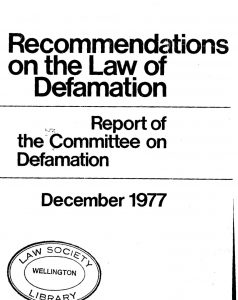A Word About Malice
Section 19 of the Defamation Act, which deals with rebuttal of qualified privilege, has long been a head scratcher. What was Parliament thinking when it enacted the section?
In 1977, the Report of the Committee on Defamation–now referred to as the McKay Report/Committee–said jurors had difficulty distinguishing between the legal definition of malice and the meaning ascribed to the word in normal usage. It is not clear whether this apparent difficulty was based on experience or supposition. Certainly there are precious few reported cases of any retrials being ordered in New Zealand on the basis of a defective verdict upon rebuttal of qualified privilege, or even record of a jury’s questions to the court about malice. In any case, the Committee recommended that Parliament “remove the word ‘malice’ from the law of defamation altogether and express the concept in a way that can be easily understood by the layman“.
In its draft Bill, the Committee suggested the following wording for rebuttal of qualified privilege:
(1) In an action for defamation, a defence of qualified privilege by a defendant shall fail if the plaintiff alleges and proves that, in publishing the matter in respect of which which the action is brought, the defendant was actuated by spite or ill-will towards the plaintiff or otherwise took improper advantage of the occasion of publication.
(2) Without prejudice to the requirements of subsection (1) of this section, a defence of qualified privilege by a defendant shall not fail by reason of malice on the part of the defendant.

The only significant amendment to this wording through the Bill’s legislative passage was that, on the submission by well-known defamation lawyer (and later Employment Court Judge) Tom Goddard, the phrase “actuated by spite or ill-will” was amended to “predominantly motivated by ill-will“.
As it transpires, the more ‘simple’ test for rebuttal of qualified privilege, where “the plaintiff proves that, in publishing the matter that is the subject of the proceedings, the defendant was predominantly motivated by ill will towards the plaintiff, or otherwise took improper advantage of the occasion of publication“, is quite the mouthful, and difficult to summarise succinctly without using the word ‘malice’. In fact, experience shows that, at trials, the parties and Court routinely revert to ‘malice’ as a convenient shorthand, at least in chambers discussion.
Lurking in such usage, however, is the idea that Parliament has abandoned the word ‘malice’ from the defamation-law lexicon.
But has it really? It is submitted: no.
The Defamation Act provides expressly for change in nomenclature in sections 8(1) and 9: that the defences “known before the commencement of the Act” as justification and fair comment “shall be known” as the defences of truth and honest opinion.
By contrast, all section 19 says is that, subject to the mouthful above, a defence of qualified privilege “shall not fail because the defendant was motivated by malice“.
It is submitted that, whatever the McKay Committee’s intentions, its suggested wording for rebuttal of qualified privilege, which materially was carried through to the current Act, has not given rise to a change in nomenclature; only that the bounds of ‘malice’ that may rebut qualified privilege, are restricted to the criteria in subsection (1).
So what defeats qualified privilege?
Another submitted error in everyday interpretation of section 19, has been courts’ tendency to dichotomise “ill-will” and “improper advantage“, and ignore the plain wording of s 19(1) – particularly the words “or otherwise”. Section 19(1) provides:
In any proceedings for defamation, a defence of qualified privilege shall fail if the plaintiff proves that, in publishing the matter that is the subject of the proceedings, the defendant was predominantly motivated by ill will towards the plaintiff, or otherwise took improper advantage of the occasion of publication. (Emphasis added)
It is submitted the essence of rebuttal of qualified privilege, is that the plaintiff proves, on the balance of probabilities, that the defendant “took improper advantage of the occasion of publication“. That is all.
So, if the plaintiff proves that the defendant, in publishing the matter that is the subject of the proceeding, was “predominantly motivated by ill-will towards the plaintiff“, then this amounts to one such instance of “improper advantage” by which the privilege may be rebutted.
Section 19(1), then, can be seen to cite one example of “improper advantage“. Conduct that may “otherwise” give rise to an inference of improper advantage, is guided by common-law development.
A final misnomer to be highlighted, is that the words in the legislation are “improper advantage“; not “improper purpose“. Pursuant to the Court of Appeal’s decision in Lange (No 2), malice may be established by conduct that falls short of overseas conceptions of recklessness. In the US, recklessness may only be inferred if the plaintiff proves the defendant “entertained serious doubts as to the truth“; and in the UK, the bar for recklessness is set, somewhat lower, at “wilful blindness“.
But in New Zealand, the flexibility of “improper advantage” has allowed courts to infer malice even upon careless conduct.
Our favourite clip dealing with malice:
